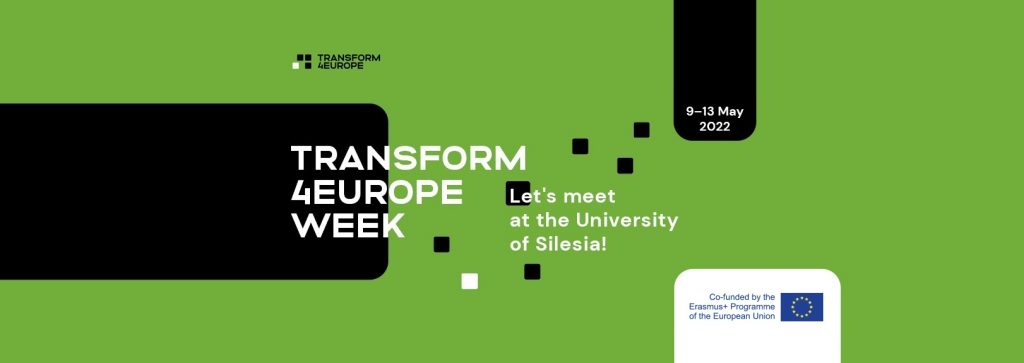Transform4Europe Week
Let’s meet at the University of Silesia!
9–13 May 2022 | Poland
About
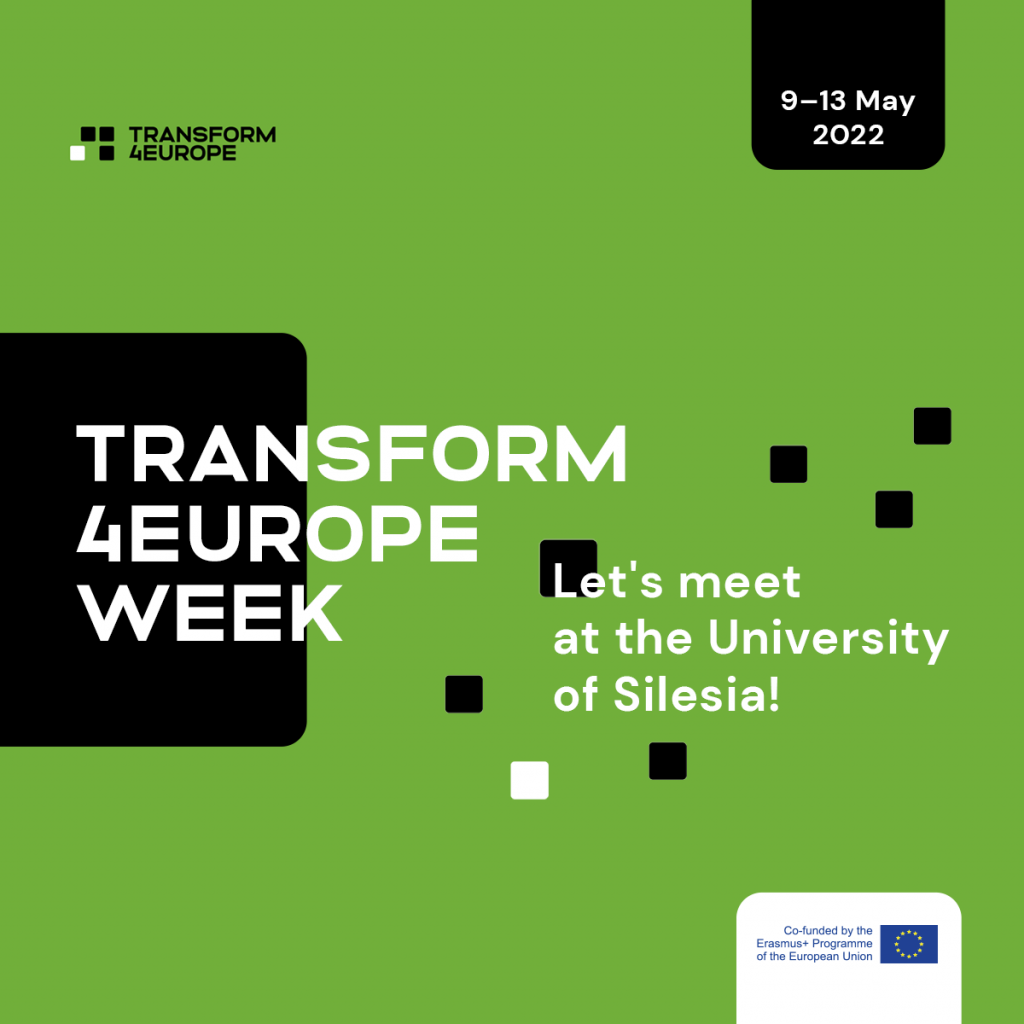
A few days – is it enough to get to know each other better? We checked it during the first Transform4Europe Week. It was one of the events initiated by our European University. During this time there were meetings, conversations, workshops, shows and many other events so that we could learn more about each other.
The organiser of the pilot edition was the University of Silesia in Katowice. In May 2022 we hosted in Poland almost 300 people, including students, PhD students, as well as academic and non-academic staff representing each of the alliance’s universities.
Five days were filled with a rich offer of master classes, joint research projects, didactic classes, excursions, workshops and artistic events. We had a chance to learn different languages as part of the Languages for Lunch initiative. Afternoon meetings allowed us to get to know the local art and culture better. Concerts and thematic evenings were organized in cooperation with the Student Government at the University of Silesia. Evening attractions took place both in clubs and in outdoor locations. It is worth noting that Transform4Europe Week was also an online meeting prepared for the whole academic community of our European University.
T4EU WEEK – LET’S EXPERIENCE IT ONCE AGAIN
The Transform4Europe Week had its official opening at the pedestrian area on ul. Bankowa in Katowice. Prof. Ryszard Koziołek, Rector of the University of Silesia, welcomed the guests. The participants sang Ode to Joy and danced polonaise to the music by Wojciech Kilar.
The official opening ceremony was preceded by a press briefing with representatives of the Transform4Europe alliance.
Afterwards, rectors, scientists, and doctoral students representing our European University took part in a debate on the challenges facing science in 21st century Europe.
A meeting of the Executive Board members was also planned for that day. It was an exceptional meeting because during its course a letter of intent of the agreement with the next two European universities: Universidade Católica Portuguesa (Portugal) and Univerza na Primorskem (Slovenia) was signed.
Immediately after the debate, there will be a kick-off stream: a meeting of a less formal nature to get to know university representatives better and to discuss mutual expectations of the opportunities created by the alliance.
Administrative employees will participate in the first joint meeting, during which they will present their universities and tell us about their responsibilities at their respective universities.
Students, in turn, started the day with classes constructed with three main thematic paths of the Transform4Europe alliance in mind:
- digital transformation and smart regions,
- environmental transformation and sustainability,
- societal transformation, community building and inclusion.
On Monday, an informal Languages for Lunch workshop begun, conducted by foreign language teachers from the University of Silesia for the participants of the Transform4Europe Week. The meetings were organised on 9, 10, 12, and 13 May and concerned the following languages: Arabic, Korean, Polish, Ukrainian, and English.
Students and doctoral students of the University of Silesia had the opportunity to participate in the lecture entitled “The importance of translational education for contemporary careers paths: a testimony” delivered by Roberto Della Marina, the founder and Managing Partner of the Venture Factory Srl.
The inaugural ceremony of the Transform4Europe Week – Europe Day took place on 9 May at 6 p.m. in the building of the Silesian Parliament in Katowice.
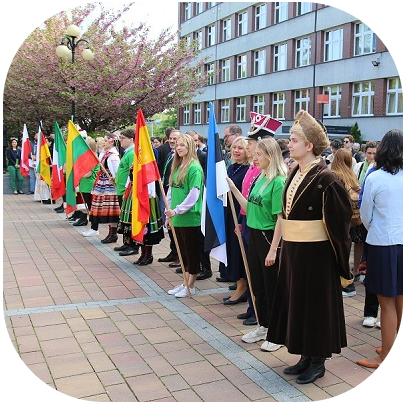
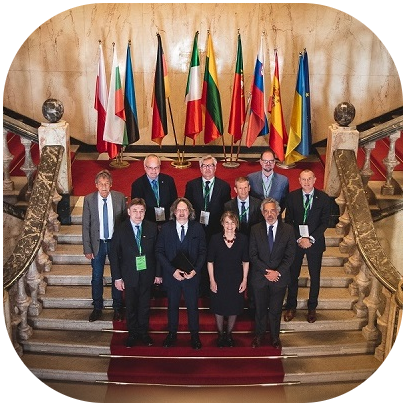
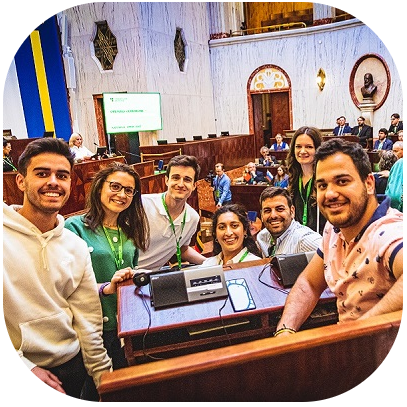
Administrative staff was gather in several groups and discuss their experiences in, among others, the areas of national and international cooperation, promotion and media, projects and education.
Researchers, on the other hand, had the chance to take part in a workshop entitled “Challenge-based teaching methods: Teaching for action: Changing attitudes to promote the Sustainable Development Goals through challenge-based teaching”. This meeting organised as part of the T4EU Professional Development Training initiative.
Benedikt Schnellbächer, PhD delivered a lecture for students under the title “An introduction to knowledge entrepreneurship”.
Meetings of T4EU Student Council members and steering committees also took place that day.
On Tuesday, an excursion was organised during which participants learned about the history of Katowice and saw one of the most interesting districts of the city – Nikiszowiec, the Guido Mine, the Silesian Park: funicular railway ride, and the Ethnographic Museum.
Roberto Della Marina gave a lecture for all residents of the region in Rawa.Ink.
The works of students and doctoral students who participated in the first Animation Online Course by EKA Summer Academy were displayed on the terrace of the Faculty of Humanities.
There was also a integration meeting for all T4EU Week participants scheduled for Tuesday.
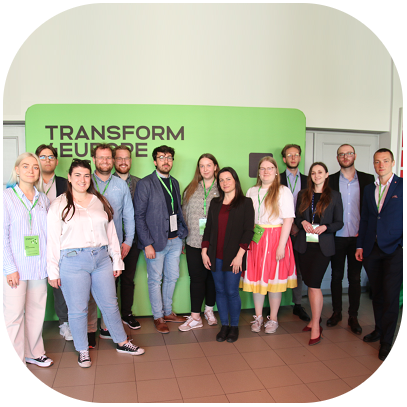
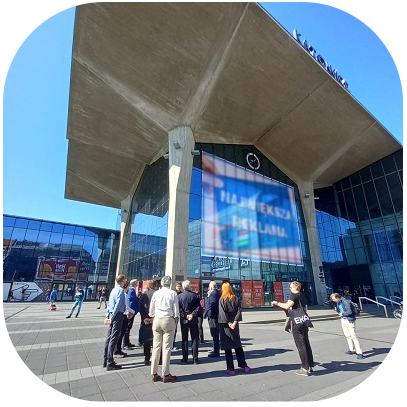
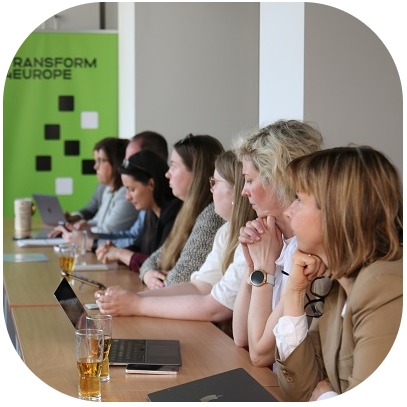
On Wednesday, all participants of T4EU Week went to Cieszyn. It was the time for members of the Management Board and joint offices of our European University to hold meetings.
Students, doctoral students, and employees of the faculty in Cieszyn prepared a wide range of workshops for the participants of T4EU Week, including art glass workshops, lithography workshops, and comic book workshops.
Participants had also a chance to tour Cieszyn, the artistic capital of the Silesian Voivodeship, see an exhibition, and attend a concert by Madame Jean Pierre.
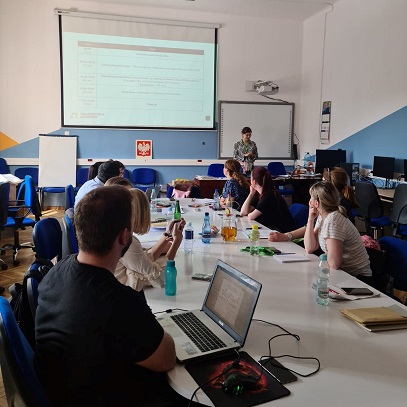
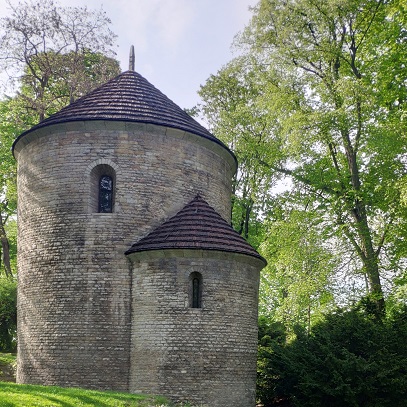
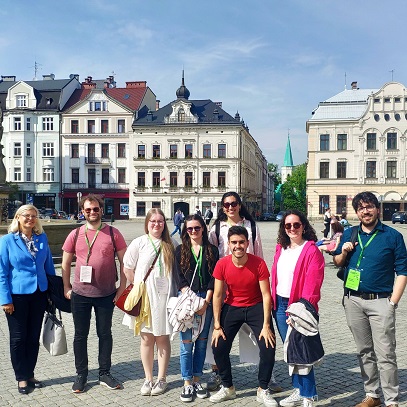
This day started with workshops organised as part of the Professional Development Training series. Participants had the opportunity to learn how to effectively structure team cooperation, how to properly manage work time, and how to deal with stress.
During the workshop “How to write a successful research project?”, Mechthild Baumann, PhD, a specialist in raising EU funds, shared her experience in successfully obtaining grants in calls for proposals of the European Commission and other funding programmes. She authored books explaining how to translate the innovativeness of modern scientific research into applicability.
In the afternoon guests were able to take part in three excursions. In Chorzów, they visited the Royal Ironworks Museum, and in Sosnowiec, they followed the trail of the Jewish community of the Zagłębie region. In the Silesian Park in Chorzów, in addition to a funicular railway ride, there was a chance to visit the Ethnographic Museum housing historical wooden buildings of rural and small-town architecture.
In the evening, Telmo Fernández Castro, PhD, Director of the Planetario de Madrid, hosted an astronomy show entitled “Cosmos ad libitum” with live music. The event took place at the Faculty of Humanities in Katowice.
The day culminated with the Kultura Natura [Culture Nature] symphonic concert and the Węgiel Film Festival. The concert took place in the concert hall of the Polish National Radio Symphony Orchestra (NOSPR) as part of the Katowice Kultura Natura Festival. During the Węgiel Film Festival, the works of film students from around the world have been presented. The event was a great opportunity to exchange views on the presented films and their artistic side.
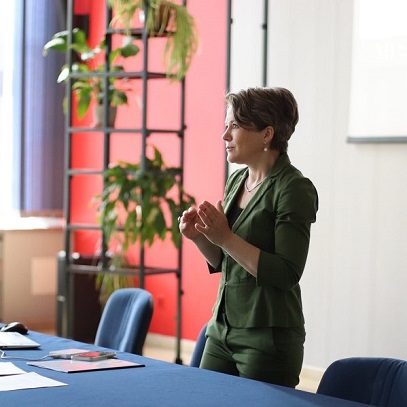
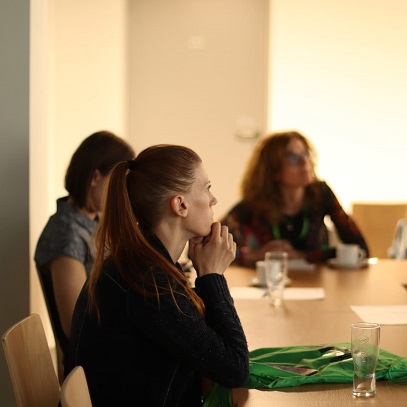
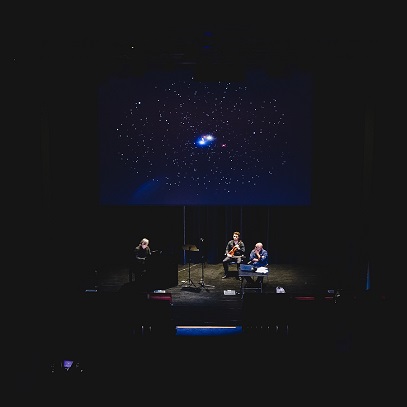
During individual meetings and consultations, T4EU administrative staff got an opportunity to see what work at the University of Silesia looks like.
The scientists who visited Katowice during the pilot edition of the event took part in seminars concerning the following three subjects: digital revolution, social transformation and environmental changes.
On this day, T4EU Week participants visited Nikiszowiec, a traditional coal mining district of Katowice, took a walk in the footsteps of the Jewish community of Sosnowiec, and saw the films shown during the Węgiel International Student Film Festival. During the trip to the park and palace of Heinrich Dietel, ‘King of Wool’, the foreign guests got to know the historical highlights of Sosnowiec.
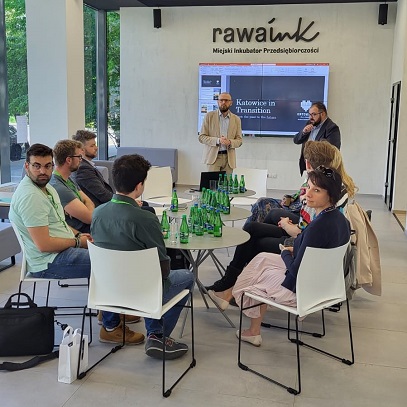
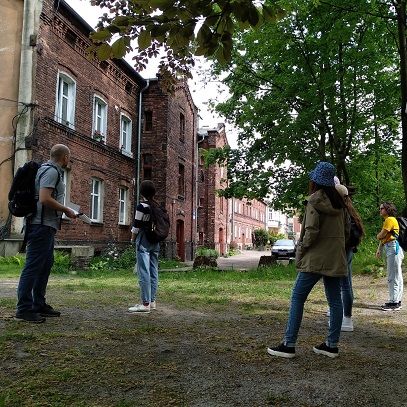
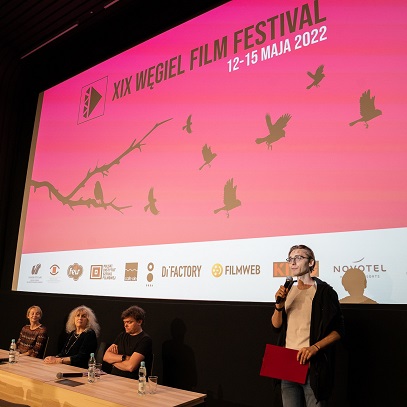
Parallel to the amazing on-site event of the pilot T4EU week at the University of Silesia, Saarland University is offering online German introductory course open for all as well as a varied programme on the campus in Saarbrücken.
German for fun: an introductory course by Dr Oxana Brandes, International Study Center Saar, Saarland University
Three 45 minutes sessions will place on Tuesday, Wednesday and Thursday (10 – 12 May) at 10 AM. The sessions are not linked with each other and can thus be attended independently from each other.
The course addresses all target groups (students and staff) who have no or very little knowledge in German.
The link for the 3 sessions is the same – just follow it here.
Participants do not need to register but can just join the session.
In our course we will learn some tricks which make your stay and communication in Germany easier.
10.05., 10 AM (45 min. session): greetings and introducing
11.05., 10 AM (45 min. session): food and drinks, specialities from Saarland
12.05., 10 AM (45 min. session): e-mail communication at a German university
Other Activities on campus:
Besides the online German classes, Saarland University is offering a varied programme on their campus linked to the T4EU week with events in English and German on topics such as European solidarity, sustainable design and many opportunities to learn the languages of the Transform4Europe partners. Please find the whole programme here.
Debates, workshops, joint research projects, the possibility of learning about Silesia and integration are the things the participants of the Transform4Europe Week could expect on 9-13 May 2022. Within the event, we had parallel activities for groups of academics, administrative employees of universities, PhD students, and students of the seven universities co-creating the European campus of the Transform4Europe.
Download the schedule (PDF)
Download the T4EU Week info pack (PDF)
update: 09.05.2022
T4EU WEEK – SEE MORE
At the basis of cooperation within the Trasform4Europe alliance lies the conviction that universities can play an important role in the processes of European transformation – among others through education and training of students. Therefore, the curriculum for those who will participate in Transform4Europe Week has been prepared based on three pillars: digital, environmental, and social transformation.
Between 9 and 13 May, groups of about twenty students from seven countries will participate in modules conducted by researchers from the University of Silesia and partner universities. The offer includes classes in social sciences and humanities as well as new information technologies. Students of environmental sciences will go into the field to examine the specific features of the region, including its post-industrial conditions, under the guidance of Silesian specialists.
It is worth emphasising that the educational offer takes into account not only those who will come to Katowice in May. It will be possible to participate in most of the twenty modules remotely. This reflects the assumption of equal accessibility to the entire event.
In addition to daily classes, students of the universities of the alliance will be involved in a variety of activities prepared by the University Council of the Student Government of the University of Silesia in Katowice. The plans include, among others, regional dance workshops, a picnic and a visit to the Silesian Museum.
Among the goals of the Transform4Europe, a crucial place is taken by the exchange of educational and research experiences, and the creation of an international campus (which will be a network of laboratories, libraries, and other elements of research infrastructure available for all partner universities).
The Transform4Europe Week will bring us closer to achieving these goals. In Katowice, we will host five educational and research employees from each partner university. Regardless of the country their Alma Mater is located in, academics face similar administrative problems, apply for the same calls for proposals, and work according to the same framework (Bologna Process). The exchange of good practices and individual experiences will surely benefit all researchers visiting the University of Silesia in May.
What do scientists from our University want to offer to their colleagues within the Research Stream? Among others the debate Challenges of the European Science in the 21st century, workshops on effective research projects (conducted by M. Bauman, PhD, from Berlin), and training on preparing a scientific poster/abstract/conference presentation.
Science conference regulars know that behind-the-scenes discussions are invaluable. Therefore, members of the Alliance will have time for informal exchange of thoughts as well. There are numerous attractions outside the campus prepared, among others: a field trip to Nikiszowiec, a historic district of Katowice, participation in astronomical projection, and a concert extraordinaire by the Polish National Radio Symphony Orchestra.
Transform4Europe Week is a unique opportunity to meet new people, establish research contacts, and exchange experiences with young scientists. It is also a unique opportunity to participate in international research teams tailored to the interests of doctoral students from all universities of the Transform4Europe alliance.
By participating in Transform4Europe Week, you will find out what research your colleagues from other allied universities are conducting and you will become part of our European university network. You’ll take part in a debate entitled “The challenges for science in Europe in the XXI century”. You can also expect: many meetings in an international group of researchers, events to establish new scientific contacts, and initiatives through which you will discover one of the most interesting regions in Poland and its attractions.
See how they do it at other universities!
Did you know that each Transform4Europe university has people who face the same challenges as you do? They take care of promoting their university, quality of academic exchange, staff development, and professional student service.
Did you also know that you can meet these people and share with them your own good practices during an exceptional Transform4Europe Week event?
What you can expect:
- workshops in six thematic groups responsible for scopes of work of individual departments of university administration,
- training sessions and webinars in professional development,
- meetings and consultations within job shadowing.
The event will be an opportunity to meet Joint Virtual Offices face-to-face for the first time, as so far they have been cooperating remotely on communication, mobility, and staff management.
The Transform4Europe Week for administrative staff is also an opportunity to see our university and sightsee the most interesting places in Silesia, e.g. Guido Coal Mine or Nikiszowiec District.
Mark the dates in your calendar: 9-13 May 2022.
In this part of the programme, we will present works and projects of artists associated with the University of Silesia, as well as the achievements of art students from faculties of partner universities.
Cultural and social stream is a programme for all participants of Transform4Europe Week. We will prepare workshops, during which we will reflect together on what challenges our regions are facing and what we can do to make them even better places for their residents. Afternoon activities will give you a chance to learn more about the culture of Silesia, which is one of the most distinctive places in Poland. We will hold concerts and meetings in clubs and open spaces.
Transform4Europe Week will take place from 9 to 13 May 2022. It is the first such event carried out under the framework of the European University, in which students, doctoral students, and employees of all the universities of the alliance participate.
The first edition is organised by the University of Silesia in Katowice. For five days, the participants will take part in joint research projects, classes, master lectures, trips, and many other activities.
We cordially invite all members of the academic community of the University of Silesia to participate in the open event organised as part of Transform4Europe Week. In cases of events requiring registration, the registration order will be decisive.
9 May
9 a.m. – 9.30 a.m. – “Transform4Europe Opening” – the inauguration of Transform4Europe Week will take place at the pedestrian area of the University of Silesia at ul. Bankowa.
9.45 a.m. – 11.45 a.m. – debate entitled “The challenges for science in Europe in the 21st century Round Table and Debate”. During the university debate featuring rectors and vice-rectors of the alliance partners, there will be an attempt to reflect on the direction of the development of science in particular regions and entire Europe, as well as to formulate joint priority research areas for all members of the Transform4Europe alliance.
Every member of the academic community interested in the topic of the meeting will have the opportunity to participate in the discussion.
The event will take place in the Kazimierz Lepszy Lecture Hall in the Rectorate of the University of Silesia in Katowice (ul. Bankowa 12).
5.30 p.m. – 9 p.m. – a student event opening Transform4Europe Week, having also a character of an integration meeting. It will take place in the pub “Drzwi zwane koniem” (ul. Warszawska 37). Free entry.
6 p.m. – 7.30 p.m. – Opening Ceremony – Europe Day Celebration – the ceremony opening Transform4Europe Week in the parliamentary chamber of the Silesian Parliament (ul. Jagiellońska 25.) Registration for the event is required. Those interested in participating in the ceremony are kindly requested to contact us at inauguracja@us.edu.pl.
10 May
5 p.m. – 6.30 p.m. – lecture entitled „The importance of translational education for contemporary careers paths: a testimony” conducted by Roberto Della Marina, PhD (Venture Factory Tech/ University of Trieste). During the lecture, the scientist will describe the challenges facing today’s labour market due to the still-emerging new services, products, and business models. The emphasis is also put on the necessity for elastic education of future employees to make it easier for them to exercise their profession in changing conditions.
The event will take place in the Rawa.Ink area in Katowice (ul. Teatralna 17a). Registration is not required.
6.30 p.m. – 9.00 p.m. – integration meeting for all participants and members of the academic community of the University of Silesia combined with dancing and folk dance lessons, for which invites you the Student Song and Dance Ensemble “Katowice”. The event will take place in the courtyard of the Faculty of Humanities of the University of Silesia (ul. Uniwersytecka 4). Animations created by students during the Summer Academy of Animation 2021 organised by the Estonian Academy of Arts in Tallinn will be also presented as part of the event (at the patio of the Faculty of Humanities). Entry is free of charge.
11 May
7 p.m. – 9 p.m. – concert by the employees of the Institute of Music at the Faculty of Arts and Educational Science of the University of Silesia and the band Madame Jean Pierre at the National House in Cieszyn (ul. Rynek 12). We kindly request all those interested in participating to contact us at transform4europe@us.edu.pl.
12 May
6 p.m. – 7 p.m. – astronomy show entitled “Cosmos ad libitum” by Telmo Fernandez Castro, PhD, Director of the Madrid Planetarium. The astronomer will be accompanied by musicians performing live for the show. The event will take place in a lecture hall of the Faculty of Humanities in Katowice (ul. Uniwersytecka 4). Registration is not required.
Katowice
The capital of Silesian Voivodeship was established in 1865. Even though it is a relatively young city, it serves as an example of how a post-industrial city can transform into a place of innovative technology and ecological solutions.
From its very beginnings, Katowice has been strongly connected with science. One of the founders of the city was Richard Holtze, a respected physician. It is also the birthplace of the Nobel Prize winner in physics, Maria Göppert-Mayer, whose image has been immortalised on the wall of the Rectorate of the University of Silesia (ul. Bankowa 12) visible from the Rawa river.
The historic district of Nikiszowiec is a heritage of mining culture. In the branch of the Museum of Katowice History located there (ul. Rymarska 4) presented is the interior of a traditional miner’s apartment as well as a laundry room and mangle.
In the centre of Katowice, visitors are met by the iconic Spodek Arena, which first opened in 1971. The modern architecture of the city can be recognised, among others, by the design of the buildings of the Polish National Radio Symphony Orchestra (NOSPR, pl. Wojciecha Kilara 1), International Congress Centre (pl. Sławika i Antalla 1), and Silesian Museum (ul. Dobrowolskiego 1), which adapted the grounds of the former coal mine “Katowice”.
University campus
The University of Silesia occupies nearly 20 buildings, in which the Rectorate, faculties, and the Scientific Information Centre and Academic Library (CINiBA) are housed.
Did you know that…?
The Himalayan mountaineer Jerzy Kukuczka, who was the second person ever to reach the Crown of the Himalayas and Karakoram, came from Katowice.
Public transportation and the Tourist Information Centre
All the information regarding public transport and timetables is available at the Tourist Information Centre (ul. Rynek 13).
Contact:
(+48) 322 593 808
e-mail: katowice@silesia.travel
Cieszyn
Cieszyn is one of the oldest cities in Silesia. It received city rights at the beginning of the 13th century. From 1290 to 1918 it was the capital of the Duchy of Cieszyn.
It is located on the border of Poland and the Czech Republic. The centre of the city lies in the Polish part of Cieszyn. The Czech part of Cieszyn is called Český Těšín. The Olza river flows through the city.
There are many are many secular and sacra objects among its architectural monuments. One of the most characteristic one is the Romanesque Rotunda of Saint Nicola from the 11th century, depicted on the Polish 20 zloty banknote. The “Venice of Cieszyn”, a part of the old town located by a watercourse, enjoys immense popularity.
Cieszyn is a city closely connected with nature. 23% of the city’s area is covered with green areas, while the built-up areas remain heavily wooded. There are 3 wildlife reserves. It also boasts rich fauna – you can come across, among others, herons, European tree frogs, and muskrats.
University campus
The Faculty of Art and Educational Science is located in Cieszyn.
Did you know that…?
The Teschenite rock (Polish: cieszynit) was named after the city of Cieszyn. It was first researched and described by geologist Ludwig Hohenegger. Teschenite is a magmatic, deep-sea, alkaline rock formed in the Lower Cretaceous.
Public transportation and Cieszyn Information Centre
All the information regarding public transport and timetables is available at the Cieszyn Information Centre (ul. Rynek 1).
Contact:
+48 334 794 248
e-mail: cieszyn@slaskie.travel
